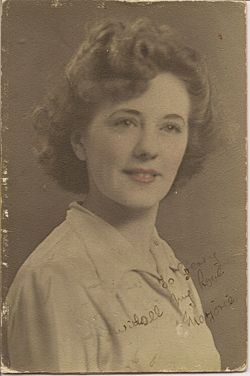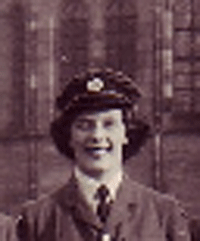Wall of Service
Column
15
Row
22
Marjorie Franklyne was just a young woman when she arrived with her first born, a son who was just shy of his first birthday. He was a toddler and she carried him in her arms as she disembarked from the Queen Mary. The date was August 8th, 1946 and she and young Johnnie, were stepping into a world as foreign as the accents that greeted them.
They landed where 1.5 million other immigrants would also enter Canada, the Gateway to Canada. This new land held its arms wide open as the stilled ship lay in the harbour's quiet waters. As the ship slipped smoothly into her berth, thousands of young women stood on deck some with babes in arms, as their eyes feasted on what to them was vast and perhaps somewhat on the barren side.
My mother's mind slips back in time as memories of so long ago flood the present. "Life on board one of the biggest liners to ever sail the seas, was frightening, yet exhilarating at the same time. The journey took five days and somewhere, out in the middle of the Atlantic, we ran into a fierce storm. We couldn't stand up and they put ropes up for us to hang onto." No one could stay in the confines and relative comfort of the staterooms, or even one of the lounges for that matter. "We couldn't go to our cabins, I don't know why, maybe they thought we were going to sink. One minute you could see the sea and the next, all you could see was the sky. The bow of the ship was going up and down. It was dreadful. I was sick, Johnnie was sick in my arms. He was vomiting over one arm, and I was doing the same over the other. It lasted about a day. A couple of girls from Holland, war brides, weren't sick and they came over to me and asked if they could take my baby. I let him go with them and I worried, but I was too ill to go and find him. They eventually brought him back to me when the sea settled down a bit, and of course, he was fine. I've been on rocking ships since coming to Canada, but nothing like that.
What was life like on board the Queen Mary? Did you make any friends? She replies, "Not really. The Queen Mary was decked out for war brides and troops, we were in bunks and I had a cradle at the side."
Memories as vivid today as they were so long ago, permeate her mind. Her first impression of Canada left her amazed at the trees. "So many trees", she recalls "there were so many," I thought it was such a big country. Well everybody does, don't they, well at least those who are coming from England. After we were processed at the immigration shed, I seem to recall walking over a lot of train tracks or something. I couldn't believe that my first impression wasn't good. I didn't like what I saw. I thought, what the heck have I come to? I took a train from Halifax to Ottawa with John, nobody met me, I was completely alone, except for my baby."
"I arrived at the old Union Station in Ottawa and there were so many people there, it was like a party, and I was so tired because I hadn't slept. It only took us five days to come across and we experienced a storm, so that wasn't bad, but then I had to travel by train for what seemed an eternity. I was tired, and not in the mood for a party. I don't know what your father and his family thought of me. All I wanted was to sleep. I tried my best to be responsive and lively, but it was a losing battle."
I ask her about her first winter and she replies, "Well, I didn't feel the cold too much and I couldn't believe that there was so much ice. Everywhere, even on the sidewalks." My mother never adjusted to the freezing rain and the ice that would plague her every winter. To watch her is amusing, a penguin in action.
As the days flew by and months became years, she met whom I came to know as my Auntie Jess. They met on the Montréal Road in what was then Eastview, at a clinic for babies. "There was a clinic on the Montréal Road, near St. Margaret's Church. It was a baby clinic where you could go in and have the baby weighed and that's where I met her when she was taking her baby girl into the clinic." Auntie Jess' first-born, Anne Marie and I would become life-long friends, having shared a playpen when we were babies, to dinner as we grew older.
The war brides became instant friends and in a few years, more war brides and families native to Great Britain would form bonds that would endure the test of time. Only death would separate them.

